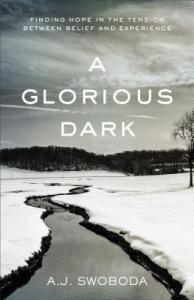
A Glorious Dark: Finding Hope in the Tension Between Belief and Experience by A. J. Swoboda. Grand Rapids, MI: Baker Press, 2015.
Summary: An exploration of living in the tension of the glorious hope of Christian faith and the dark, unsettling realities of our lives through reflections grouped around the Friday, Saturday, and Sunday of the Triduum of Holy Week. A great book to read reflectively during Holy Week [April 9 – 16, 2017].
A. J. Swoboda opens this book with the image of a frozen river, apparently dead and still on the surface, but beneath the ice, flowing and alive–“a glorious dark”, he calls it, which he sees as an image for our faith, lived in the tension between our surprising and glorious hope and the struggles and questions and failures of our own lives.
The book is organized around the three days of the Triduum: Good Friday, Saturday, and Easter Sunday. Friday is the time when we are faced with the reality that “the monster at the end of the book” (reprising his childhood hero Scooby Doo) is us. He explores our struggles with God’s “Fatherhood” and how Jesus discloses something of the kind of Father we have in God. He explores how God journeys with us in life, making the map as we go. Perhaps the most striking chapter in the Friday section is titled “Numb” where he describes his own struggle with alcoholism and the striking moment where Jesus refuses to numb the pain of the cross with alcohol and myrrh. And he concludes with the striking moment where God seems to forsake God on the cross.
Saturday is about waiting in uncertainty. We want to move right from suffering to triumph. In some sense, our whole lives right now are lived between Good Friday and Easter in Holy Saturday and it is there we must sit. Saturday tells us we can’t pick and choose our life in some kind of “faith boutique”. We must learn to rest in this day which for the Jews is “sabbath” before the Sunday of new creation.
And then there is Sunday–beginning for Swoboda with the amazing vindication of Mother Mary in the Resurrection–the woman who as a pregnant teen, claimed she was yet a virgin, visited only by an angel of the Lord. If resurrection is true, then all the other incredible things in the narratives of Jesus beginning with this virgin conception make sense and Mary can say, “told you so!” It confronts us with surprise, a different kind of super-hero, and gives us a community that eats together, even as Jesus ate with his disciples on the shore of Galilee before being taken from them.
What I so appreciated about Swoboda was his ability to “tell it slant” (in the words of Emily Dickinson)–to help us see afresh the surprising and wonderful character of the Christian story as it breaks into our flawed and sometimes dark existence. In place of stories that have become routine and seem not to have the power to keep us awake let alone raise the dead and transform life, his writing helps capture the startling character of what we call “the good news”. One example of this comes early in the book when he writes:
Certainly God is holy–holy beyond all perceivable knowledge, wisdom, and understanding. But Hosea throws us a curveball in our understanding of how a holy God deals with unholiness. Perhaps in other religions the deities deal with evil through finger-pointing, shouting matches, or even the silencing of a perpetrator. But in Hosea, God not only looks upon evil–God takes evil on a honeymoon. How does God deal with evil?
He puts a ring on it (pp. 19-20).
I found myself pausing again and again in thankful wonder at the glory that pierces our darkness that Swoboda explores in these reflections. It has helped prepare my heart for Holy Week and I wanted to post this review today so that others might find this resource for their own Holy Week reflections.
Disclosure of Material Connection: I received this book free from the publisher. I was not required to write a positive review. The opinions I have expressed are my own. I am disclosing this in accordance with the Federal Trade Commission’s 16 CFR, Part 255 : “Guides Concerning the Use of Endorsements and Testimonials in Advertising.”
Editor’s Note: Thank-you to Bob Trube for sharing his reviews with Emerging Scholars! Bob first posted the above review on Bob on Books. ~ Thomas B. Grosh IV, Associate Director, Emerging Scholars Network
Bob Trube is Associate Director of Faculty Ministry and Director of the Emerging Scholars Network. He blogs on books regularly at bobonbooks.com. He resides in Columbus, Ohio, with Marilyn and enjoys reading, gardening, choral singing, and plein air painting.

Leave a Reply